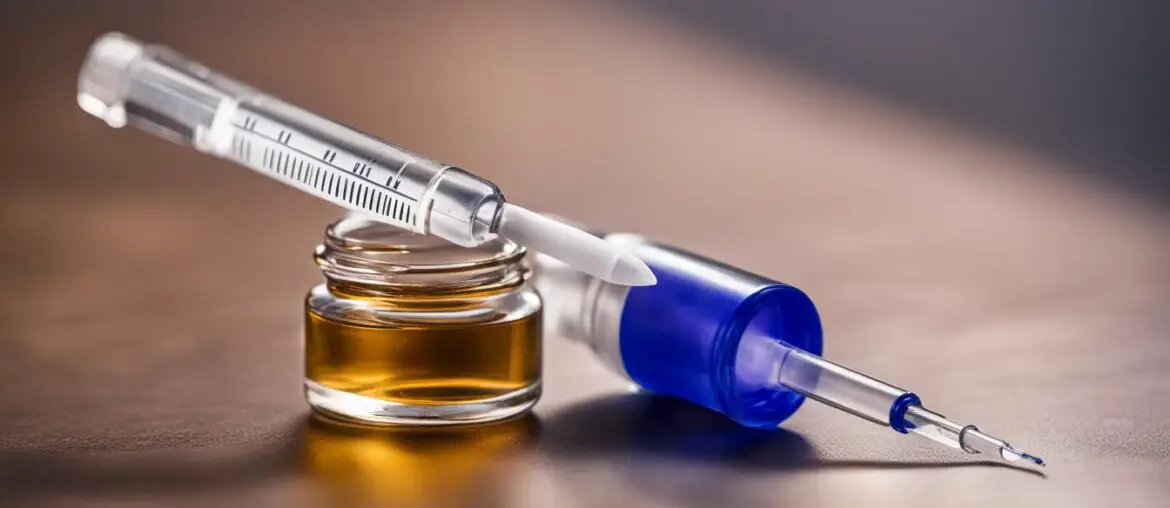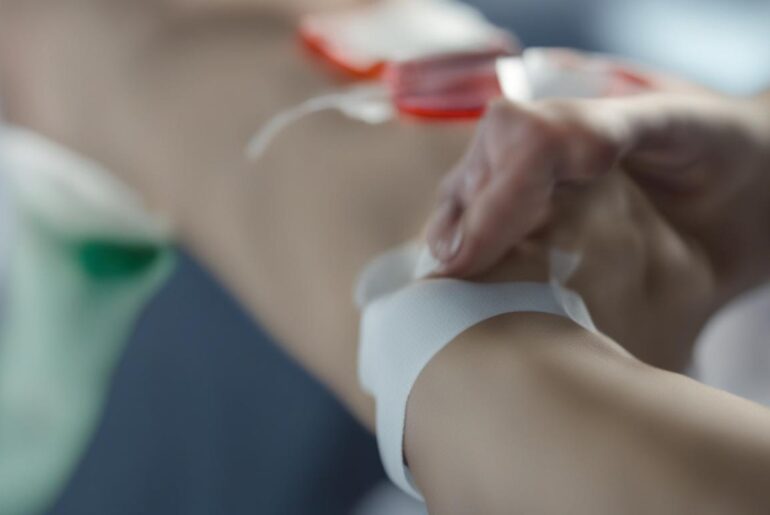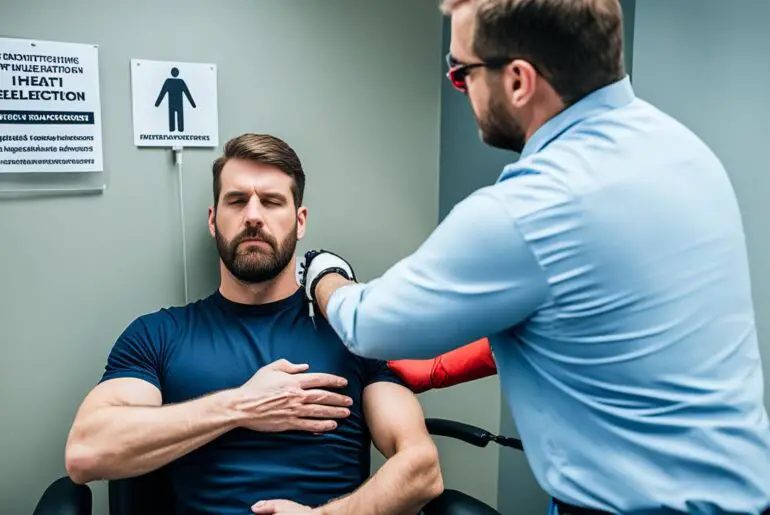Did you know that HCG injections are commonly used for ovulation induction and treating hypogonadism in both men and women? The proper dosage for safe HCG injections is crucial to ensure effective treatment and minimize the risk of adverse effects. Let’s explore the guidelines for HCG injection dosage and the specific dosages recommended for different conditions.
Key Takeaways:
- Proper dosage for safe HCG injections depends on the specific condition being treated, such as ovulation induction or hypogonadism in males.
- For ovulation induction, HCG doses typically range from 5000 to 10,000 units.
- In the case of hypogonadism in males, dosages can range from 500 to 4000 units, depending on the treatment protocol.
- It’s important to consult with a healthcare professional to determine the appropriate dosage for your specific needs.
- Following proper administration techniques and storage guidelines is crucial to ensure the safety and efficacy of HCG injections.
Usual Adult Dose for Ovulation Induction
When it comes to ovulation induction, the usual adult dose for HCG injections is 5000 to 10,000 units administered intramuscularly (IM) once. This dose is typically given 1 day following the last dose of menotropins, a medication used to stimulate the development of eggs in the ovaries. Some experts may recommend HCG doses of 10,000 units.
It’s crucial to note that patients should be appropriately pretreated with human menotropins before starting HCG injections. This ensures the eggs are ready for release and maximizes the effectiveness of the treatment. Additionally, it’s important to monitor the patient closely during the treatment process, as excessive ovarian response can occur. In such cases, treatment should be withheld to prevent potential complications.
For more comprehensive information on HCG injection safety guidelines and best practices for HCG injection dosage, refer to the following table that outlines the recommended dosage ranges:
| Condition | Usual Adult Dose | Route of Administration |
|---|---|---|
| Ovulation Induction | 5000 to 10,000 units | Intramuscular (IM) injection |
| Hypogonadism – Male | 500 to 1000 units | Intramuscular (IM) injection |
| Prepubertal Cryptorchidism | 4000 units (3 times a week for 3 weeks) 5000 units (every other day for 4 injections) |
Intramuscular (IM) injection |
Usual Adult Dose for Hypogonadism – Male
When it comes to treating hypogonadism in males, the recommended HCG injection dosage typically ranges from 500 to 1000 units administered intramuscularly (IM) three times a week for three weeks. This is followed by a maintenance dose of 500 to 1000 units IM two times a week for an additional three weeks.
An alternative dosage regimen involves using a higher initial dose of 4000 units IM three times a week for six to nine months, followed by a lower maintenance dose of 2000 units IM three times a week for three months.
It’s important to note that these dosages are for the treatment of hypogonadism and have not been studied or approved for weight loss purposes.
To provide a visual representation, here’s a table summarizing the recommended HCG injection dosage for hypogonadism in males:
| Duration | Initial Dose | Maintenance Dose |
|---|---|---|
| 3 weeks | 500 to 1000 units IM 3 times a week | 500 to 1000 units IM 2 times a week |
| 6 to 9 months | 4000 units IM 3 times a week | 2000 units IM 3 times a week |
Keep in mind that the specific dosage and treatment duration may vary based on individual factors, and it is crucial to consult with a healthcare professional to determine the most appropriate HCG injection dosage for your specific needs.
Usual Pediatric Dose for Prepubertal Cryptorchidism
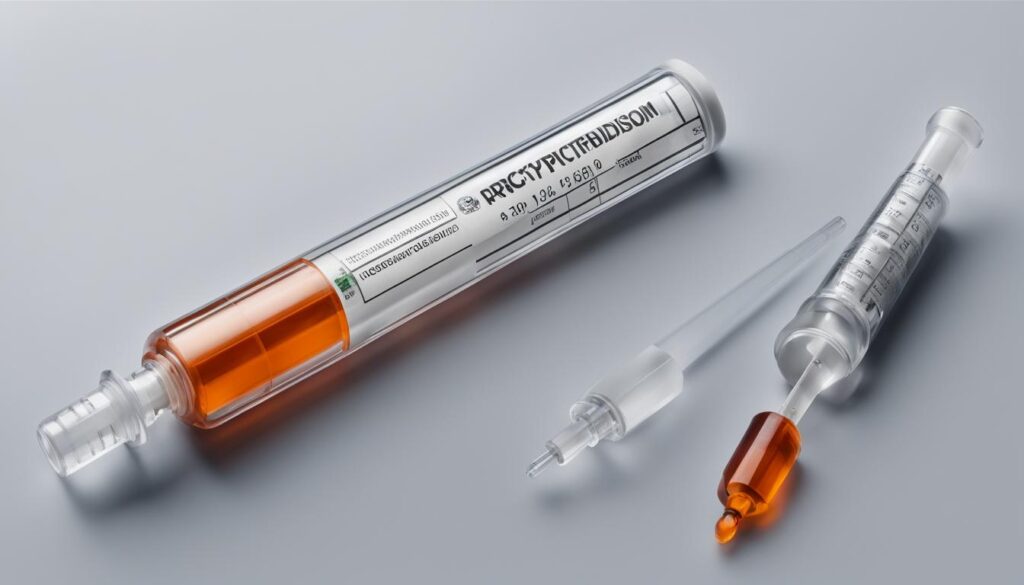
When it comes to treating prepubertal cryptorchidism, the appropriate pediatric HCG injection dosage depends on the age of the patient. Typically, for children ages 4 and older, the dosage ranges from 4000 units intramuscularly (IM) three times a week for three weeks, to 5000 units IM every other day for four injections.
It’s crucial to note that HCG treatment is believed to induce a temporary testicular descent response, and it is commonly administered between the ages of 4 and 9 years. In cases where the initial treatment is unsuccessful, additional series of injections may be given.
It is essential to consult with a healthcare professional to determine the most suitable dosage for your child’s condition and ensure the best possible results. Regular monitoring and follow-up with a healthcare professional are recommended to assess the response to treatment and make any necessary adjustments.
“The appropriate pediatric HCG injection dosage depends on the patient’s age and is typically administered between the ages of 4 and 9 years.”
Renal Dose Adjustments
When it comes to administering HCG injections, it is crucial to exercise caution in patients with renal impairment. The kidneys play a vital role in clearing drugs from the body, and any impairment in renal function can impact the metabolism and elimination of HCG. Therefore, it is important to consult with a healthcare professional to determine the appropriate dosage adjustment based on the individual’s renal function.
“As a healthcare professional, I always consider renal function when prescribing medications, including HCG injections. The adjustment of HCG dosage in renal impairment is essential to ensure patient safety and optimize treatment outcomes.”
Calculating the proper HCG injection dosage in patients with renal impairment requires a careful assessment of the individual’s kidney function. Healthcare professionals use various methods, such as creatinine clearance or estimated glomerular filtration rate (eGFR), to determine renal function. These metrics help guide dosage adjustments to accommodate for decreased kidney function and minimize the risk of adverse effects.
For patients with impaired renal function, the dosage of HCG injections may need to be reduced to avoid excessive drug accumulation in the body. Your healthcare professional will review your medical history, laboratory test results, and individual needs to calculate the appropriate HCG injection dosage adjustment for your specific situation.
Remember, safety comes first when it comes to HCG injections and renal impairment. Consultation with a healthcare professional is essential in determining the right dosage adjustment tailored to your unique renal function, ensuring optimal results and minimizing the risk of complications.
HCG Injection Dosage Adjustment in Renal Impairment
To illustrate the dosage adjustment in renal impairment, the following table provides a general guidance on the modifications of HCG dosage based on creatinine clearance (CrCl) levels:
| Creatinine Clearance (CrCl) Level | Recommended HCG Injection Dosage Adjustment |
|---|---|
| ≥60 mL/min | No adjustment necessary |
| 50-59 mL/min | Reduce HCG dosage to 75% of the usual dose |
| 30-49 mL/min | Reduce HCG dosage to 50% of the usual dose |
| 15-29 mL/min | Reduce HCG dosage to 25% of the usual dose |
| Avoid HCG injection use due to limited clinical data |
Please note that this table is for illustrative purposes only and serves as a general guideline. Actual dosage adjustments should be determined by a healthcare professional based on the individual’s specific renal function and other relevant factors.
Illustration: HCG Injection Dosage Adjustment in Renal Impairment based on Creatinine Clearance Levels
Liver Dose Adjustments
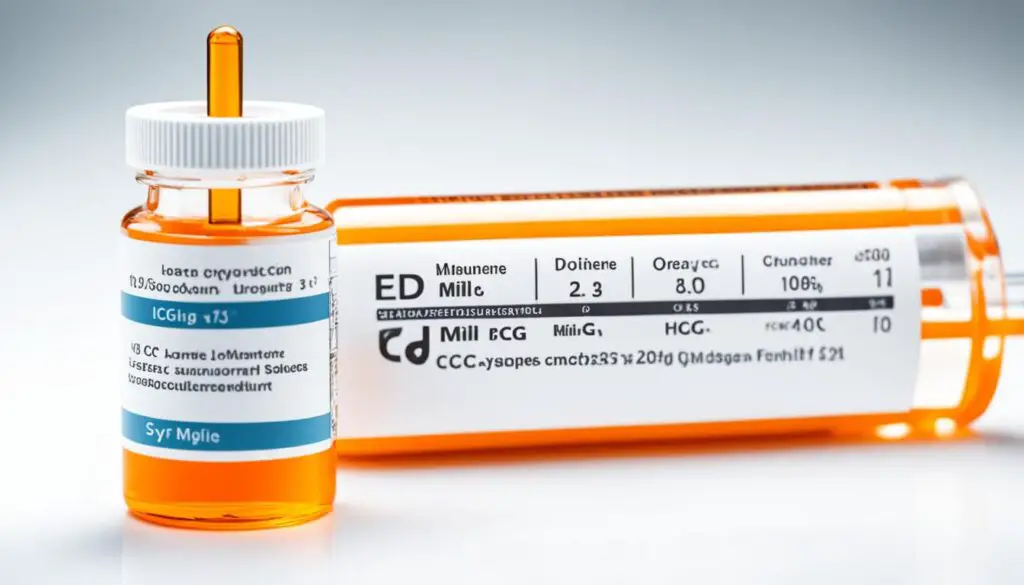
When it comes to HCG injections, liver impairment may require dose adjustments to ensure the patient’s safety and efficacy of treatment. While there is currently no specific dosage adjustment recommended for HCG injections in patients with liver impairment, it is crucial to consult with a healthcare professional to assess the individual’s liver function and determine the appropriate dosage for their specific needs.
In cases of liver impairment, the liver may not properly process and eliminate medications from the body. This can potentially affect the metabolism and clearance of HCG, leading to potential complications or adverse effects. Consulting a healthcare professional knowledgeable in liver conditions is essential in order to determine the best course of action for HCG injection dosage adjustments.
Precautions
When using HCG injections, it is essential to take certain precautions to ensure safety and efficacy. There are specific guidelines and considerations that need to be followed. It is crucial to consult with a healthcare professional and adhere to their instructions and recommendations throughout the treatment process.
Safety and Efficacy in Young Patients
It is important to note that the safety and efficacy of HCG injections have not been established in patients younger than 4 years. Additionally, the safety and efficacy of recombinant HCG gonadotropin have not been established in children. It is crucial to discuss the potential risks and benefits of using HCG injections in pediatric patients with a healthcare professional before initiating treatment.
Appropriate Pretreatment for Ovulation Induction
For individuals undergoing ovulation induction, appropriate pretreatment with human menotropins is necessary. This pretreatment ensures that the body is prepared and optimized for the effects of HCG injections. Healthcare professionals will guide patients on the specific protocols and dosage levels for both human menotropins and HCG injections to achieve the desired outcomes safely.
“By providing proper pretreatment and adhering to safety guidelines, we can maximize the chances of successful ovulation induction and minimize any potential risks or complications.” – Dr. Sarah Johnson
During the course of HCG injections, it is crucial to maintain regular communication with a healthcare professional. They will monitor the progress, adjust the dosage if necessary, and address any concerns that may arise. By following the prescribed guidelines and precautions, patients can minimize the risk of adverse effects and maximize the effectiveness of HCG treatment.
Dialysis
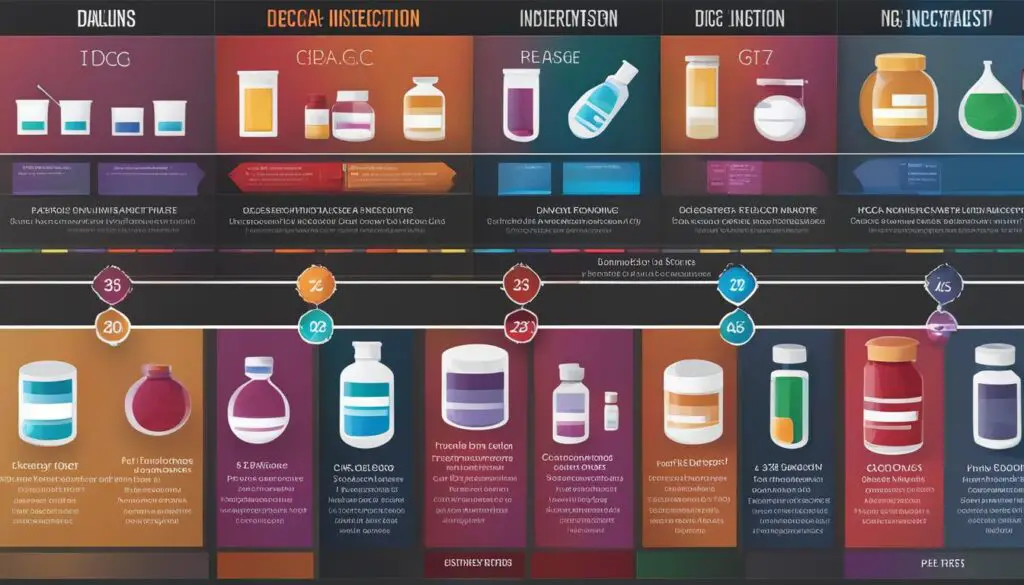
In patients undergoing dialysis, there is currently no specific dosage adjustment recommended for HCG injections. It’s important to consult with a healthcare professional to assess the individual’s condition and determine the appropriate dosage. Dialysis can have an impact on drug clearance, and a healthcare professional will consider factors such as renal function, overall health, and treatment goals to ensure the safe and effective use of HCG injections.
When administering HCG injections to individuals on dialysis, it’s crucial to closely monitor their response to treatment and adjust the dosage as needed. Regular follow-up with a healthcare professional is essential to evaluate the effectiveness of the HCG therapy and make any necessary modifications.
Other Comments
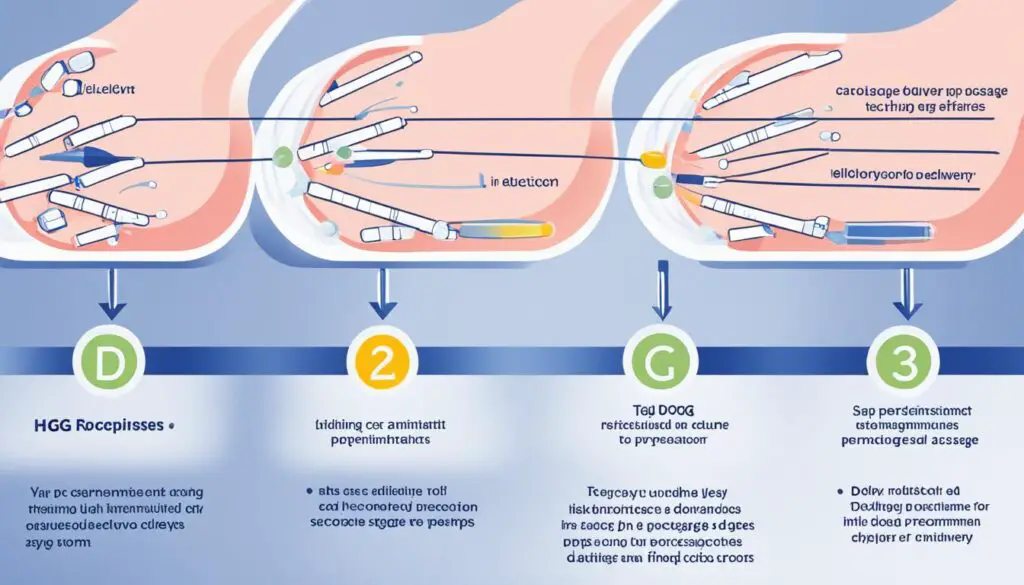
Prior to administering HCG injections, it is crucial to provide patients with proper instructions on administration techniques, emphasizing the principles of sterile techniques. This ensures the safe and effective delivery of the medication.
“Proper Dosage for Safe HCG Injections”
Once administered, needles and syringes used for HCG injections should be disposed of appropriately in a sealable, puncture-resistant container. This helps prevent accidental needlestick injuries and the spread of infection.
To maintain the efficacy and stability of HCG injections, it is important to follow the storage requirements specified by the manufacturer’s product information. This may involve storing the medication in a cool, dry place or refrigerating it.
Safe Administration Techniques
When administering HCG injections, it is important to follow these guidelines:
- Use a clean, sterile needle and syringe for each injection.
- Choose an appropriate injection site, such as the thigh or buttock.
- Rotate injection sites to prevent tissue damage or irritation.
- Follow proper hand hygiene before and after administering the injection.
By adhering to these guidelines, the risk of infection, adverse reactions, and other complications associated with HCG injections can be minimized.
| Guideline | Recommendation |
|---|---|
| Use a clean, sterile needle and syringe | For each injection |
| Choose an appropriate injection site | Thigh or buttock |
| Rotate injection sites | To prevent tissue damage or irritation |
| Follow proper hand hygiene | Before and after administering the injection |
Proper Disposal of Needles and Syringes
When it comes to disposing of needles and syringes used for HCG injections, it is important to:
- Use a sealable, puncture-resistant container specifically designed for sharps disposal.
- Avoid reusing or recapping the needles.
- Ensure the container is kept out of reach of children and pets.
- Follow local regulations or guidelines for proper disposal.
Proper disposal of needles and syringes not only protects individuals from accidental injuries but also prevents the spread of infections and promotes environmental safety.
| Disposal Guidelines | Recommendation |
|---|---|
| Use a proper sharps container | Sealable and puncture-resistant |
| Avoid reusing or recapping needles | For safety and infection prevention |
| Keep the container out of reach | Of children and pets |
| Follow local disposal regulations | Ensure proper disposal methods |
Introduction to HCG / Human Chorionic Gonadotropin for Male Infertility
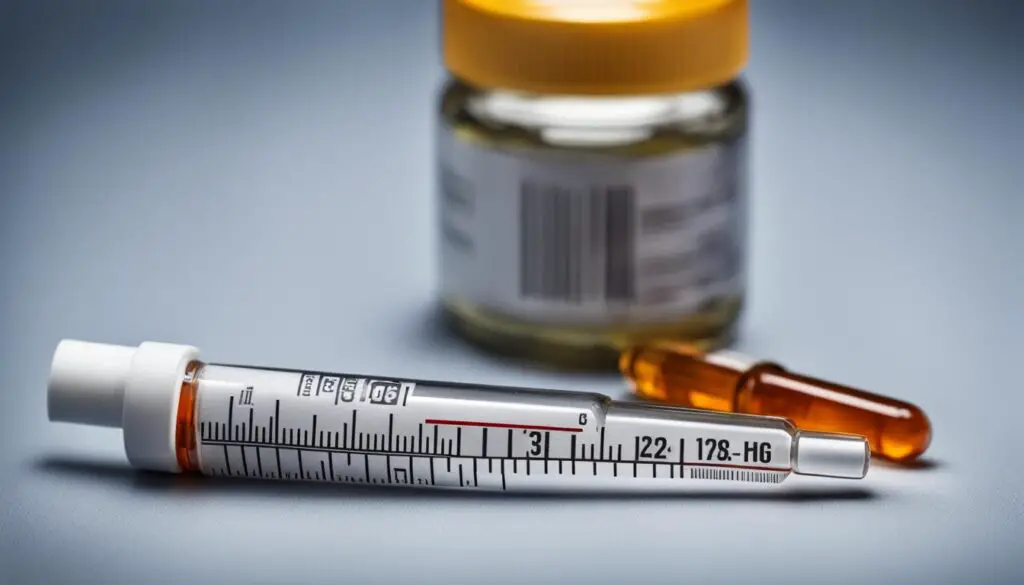
HCG, also known as Human Chorionic Gonadotropin, is a medication that mimics the action of luteinizing hormone (LH) in the body. It is commonly used to increase testosterone production in males and can be an effective treatment for male infertility. HCG has a longer half-life compared to LH, allowing for less frequent dosing, and it can be administered through injections.
When used under the guidance of a healthcare professional and in combination with appropriate hormone monitoring, HCG injections can help stimulate the testes to produce testosterone and improve fertility in men.
<!–
HCG Injection Dosage and Safety Guidelines
–><!–
HCG injections should be administered by a healthcare professional under controlled conditions, following proper dosage guidelines and safety precautions.
–><!–
| HCG Injection Dosage for Weight Loss | HCG Injection Safety Guidelines |
|---|---|
| Consult a healthcare professional for the appropriate dosage of HCG injections specifically for weight loss purposes. | Ensure that injections are administered under sterile conditions, following the recommended dosage and administration techniques. |
| Follow a structured weight loss program that includes dietary changes and regular exercise in addition to HCG injections. | Monitor for any adverse reactions or side effects and report them to your healthcare professional immediately. |
| Avoid self-administration of HCG injections without medical supervision. | Store HCG injections as per the manufacturer’s instructions to ensure potency and safety. |
–><!–
It’s important to note that the use of HCG injections for weight loss is a controversial topic, and the efficacy and safety of such usage have not been firmly established. It’s crucial to consult with a healthcare professional before considering HCG injections for weight loss purposes.
–>
Commercial Availability of HCG
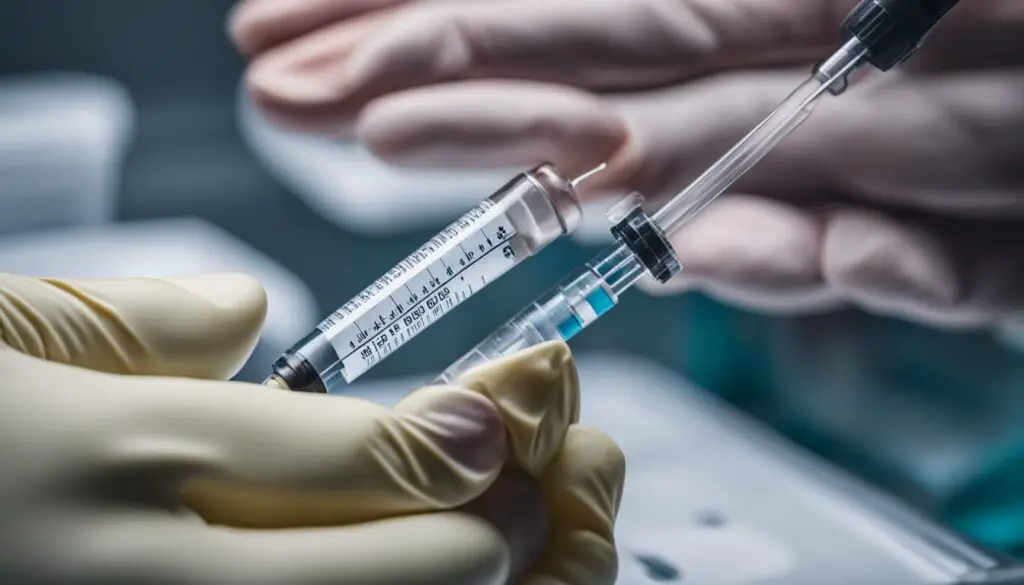
I am often asked about the commercial availability of HCG, and the answer is quite straightforward. HCG is available in various formulations, such as Pregnyl and Novarel. These formulations contain HCG that is extracted from the urine of pregnant women.
However, it is important to note that HCG may not always be readily available at local pharmacies. In fact, there is currently a nationwide shortage of HCG, which means that patients may have to order it through specialty pharmacies. It’s always a good idea to consult with a healthcare professional to determine the best course of action and to get guidance on the availability and sourcing of HCG.
Why the shortage?
The shortage of HCG is mainly due to the fact that it is a hormone that requires careful extraction and processing. Additionally, the demand for HCG has been consistently high, which can sometimes lead to supply chain challenges. However, by working closely with a healthcare professional, you can navigate through this shortage and ensure that you have access to the HCG injections you need.
Remember, when it comes to HCG injections, safety should always be a top priority. So, be sure to follow the HCG injection safety guidelines and consult with a healthcare professional to determine the recommended HCG injection dosage for your specific needs.
| Brand Name | Formulation |
|---|---|
| Pregnyl | HCG extracted from the urine of pregnant women |
| Novarel | HCG extracted from the urine of pregnant women |
Conclusion
Proper dosage is crucial for ensuring the safety and effectiveness of HCG injections. The specific condition being treated, whether it’s ovulation induction or hypogonadism in males, will determine the appropriate dosage. Consulting with a healthcare professional is key in determining the right dosage for your unique needs.
It’s also important to follow proper administration techniques and storage guidelines to maintain the integrity of the medication. Adhering to these guidelines will help maximize the benefits of HCG injections and minimize any potential risks.
Regular monitoring and follow-up with your healthcare professional are recommended to track your response to treatment and make any necessary dosage adjustments. Your healthcare professional will guide you through the process and ensure that you are on the right track towards achieving your treatment goals.
FAQ
What is the proper dosage for safe HCG injections?
The proper dosage for safe HCG injections may vary depending on the specific condition being treated. For ovulation induction, HCG doses typically range from 5000 to 10,000 units. In the case of hypogonadism in males, dosages can range from 500 to 4000 units, depending on the treatment protocol. It’s important to consult with a healthcare professional to determine the appropriate dosage for your specific needs.
What is the usual adult dose for HCG injections used for ovulation induction?
The usual adult dose for HCG injections used for ovulation induction is 5000 to 10,000 units administered intramuscularly (IM) once, typically 1 day following the last dose of menotropins. Some experts may recommend HCG doses of 10,000 units. It’s important to note that patients should be appropriately pretreated with human menotropins and that treatment should be withheld in patients with excessive ovarian response.
What is the usual adult dose for HCG injections used for hypogonadism in males?
The usual adult dose for HCG injections used for hypogonadism in males ranges from 500 to 1000 units administered IM 3 times a week for 3 weeks, followed by 500 to 1000 units IM 2 times a week for 3 weeks. Alternatively, a dose of 4000 units IM 3 times a week for 6 to 9 months, followed by 2000 units IM 3 times a week for 3 months, may be used. It’s worth noting that HCG injections have not been studied for use in weight loss.
What is the usual pediatric dose for HCG injections used for prepubertal cryptorchidism?
The usual pediatric dose for HCG injections used for prepubertal cryptorchidism depends on the age of the patient. For children 4 years and older, dosages may range from 4000 units IM 3 times a week for 3 weeks to 5000 units IM every other day for 4 injections. It’s important to note that treatment is believed to induce a temporary testicular descent response, and the age at which treatment occurs is typically between 4 and 9 years. Additional series of injections may be given if initial treatment is unsuccessful.
Are there dosage adjustments recommended for HCG injections in patients with renal impairment?
HCG injections should be used with caution in patients with renal impairment. It’s important to consult with a healthcare professional to determine the appropriate dosage adjustment based on the individual’s renal function.
Are there dosage adjustments recommended for HCG injections in patients with liver impairment?
There is currently no specific dosage adjustment recommended for HCG injections in patients with liver impairment. However, it’s important to consult with a healthcare professional to assess the individual’s liver function and determine the appropriate dosage.
What precautions should be taken when using HCG injections?
When using HCG injections, certain precautions should be taken. Safety and efficacy of HCG have not been established in patients younger than 4 years, and safety and efficacy of recombinant HCG gonadotropin have not been established in children. Patients should be appropriately pretreated with human menotropins for ovulation induction. It’s important to consult with a healthcare professional and follow their instructions and recommendations.
Are there dosage adjustments recommended for HCG injections in patients undergoing dialysis?
There is currently no specific dosage adjustment recommended for HCG injections in patients undergoing dialysis. However, it’s important to consult with a healthcare professional to assess the individual’s condition and determine the appropriate dosage.
How should HCG injections be administered and stored?
Prior to administering HCG injections, patients should be properly instructed on administration techniques, including the principles of sterile techniques. Once administered, needles and syringes should be disposed of in a sealable, puncture-resistant container. Storage requirements for HCG injections may vary depending on the specific formulation, and it’s important to consult the manufacturer’s product information for further details.
What is HCG and how is it used for male infertility?
HCG is a medication that mimics the action of luteinizing hormone (LH) in the body. It is commonly used to increase testosterone production in males and can be an effective treatment for male infertility. HCG has a longer half-life compared to LH and can be administered through injections. It’s important to note that HCG should be used under the guidance of a healthcare professional and in combination with appropriate hormone monitoring.
Is HCG readily available at local pharmacies?
HCG is commercially available in various formulations, such as Pregnyl and Novarel. These formulations contain HCG extracted from the urine of pregnant women. HCG may not be readily available at local pharmacies due to a nationwide shortage, and it may need to be ordered through specialty pharmacies. It’s important to consult with a healthcare professional and follow their guidance regarding the availability and sourcing of HCG.
Where can I find more information about HCG injection dosage?
For more information about HCG injection dosage and guidelines, it’s important to consult with a healthcare professional. They can provide you with specific information based on your individual needs and condition.

